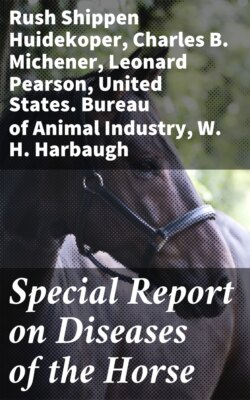Читать книгу Special Report on Diseases of the Horse - Charles B. Michener - Страница 53
На сайте Литреса книга снята с продажи.
INDIGESTION OR GASTROINTESTINAL CATARRH.
ОглавлениеFrom the facts that they merge insensibly into each other and usually occur simultaneously, there is ample reason for considering these conditions together. This condition may be acute—that is, of sudden onset—or it may be chronic. The changes of structure produced by this disease occur in the mucous membrane lining of the stomach and intestines. This membrane becomes red from increased blood supply or from hemorrhage into it, is swollen, and is covered by a coating of slimy mucus. In some especially severe cases the membrane is destroyed in spots, causing the appearance of ulcers or of erosions.
The causes of indigestion are numerous, but nearly all are the result of errors in feeding.
Some horses are naturally endowed with weak digestive organs, and such are predisposed to this condition. Anything that irritates the stomach or intestines may cause this disease. Feeds that the animal is unaccustomed to, sudden changes of diet, imperfectly cured, unripe, or damaged feeds are all fruitful causes, and so are worms. In suckling foals this condition may come from some disease of the dam that renders her milk indigestible, or from overexertion or overheating of the mare. Another prolific cause is bad teeth, making mastication imperfect, and thus causing the horse to swallow his feed in a condition unfit for the action of the digestive juices. Working a horse too soon or too hard after feeding may cause either colic or indigestion. Any condition that reduces the vitality, such as disease, overwork, poor feed, or lack of care, may directly bring on indigestion by weakening the digestive organs.
Symptoms.—Indigestion is characterized by irregular appetite; refusing all feed at times, and at others eating ravenously; the appetite is not only irregular, but is often depraved; there is a disposition on the part of the horse to eat unusual substances, such as wood, soiled bedding, or even his own feces; the bowels are irregular to-day, loose and bad smelling, to-morrow bound; whole grain is often passed in the feces, and the hay passed in balls or impacted masses, undergoing but little change; the horse frequently passes considerable quantities of sour-smelling wind. The animal loses flesh, the skin presents a hard, dry appearance and seems very tight (hidebound). If the stomach is very seriously involved, the horse may yawn by stretching the head forward and upward and by turning the upper lip outward. There may be more or less colicky pain. In the chronic cases there is mental depression; the horse is sluggish and dull. The abdomen gradually becomes small, giving a "tucked up" appearance, or, on the other hand, it becomes flaccid and pendulous.
Treatment.—One should commence with the feed—its quality, quantity, and time of feeding; examine the water supply, and see, besides, that it is given before feeding; then carefully observe the condition of the mouth and teeth; and, continuing the observations as best we may, endeavor to find the seat of the trouble. If the teeth are sharp or irregular they must be rasped down; if any are decayed they must be extracted; if indigestion is due to ravenous eating or bolting, the feed must then be given from a large manger where the grain can be spread and the horse thus compelled to eat slowly.
Any irritation, such as worms, undigested feed, etc., that is operating as a cause is to be removed by appropriate treatment, as advised elsewhere. If there is a tendency to distention of the stomach and bowels, with gas, during indigestion, the following may be used: Baking soda, powdered ginger, and powdered gentian, equal parts. These are to be thoroughly mixed and given in heaping tablespoonful doses, twice a day, before feeding. This powder is best given by dissolving the above-named quantity in a half pint of water and given as a drench.
As a digestive tonic the following is good: Glauber's salt, 2 pounds; common salt, 1 pound; baking soda, one-half pound. Of this a heaping tablespoonful may be given in each feed. If diarrhea exists, the treatment advised below may be used.
